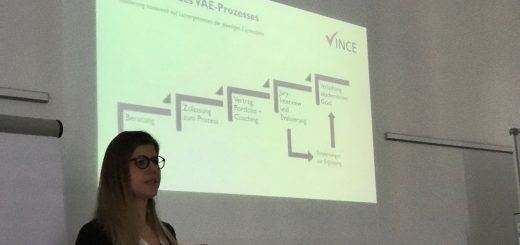Metacognitive Thinking
Today I started the day with an article about Harvard University’s project zero. It points out that meta-cognitive thinking is often understood in a too narrow sense.
Being an autonomous learner, which is the overall goal, means being a meta-strategic thinker.
Cognitive processes of understanding, applying, analysing, evaluating, etc, like indicated in Bloom’s revised taxonomy, are often tacitly used, but we need to be aware of them for strategic actions in our learning process.
This can help learners throughout their lives – so why not starting at school already?
In the last month I studied and used Anderson and Krathwohl’s taxonomy (2001). I used it to review and redesign learning outcomes for study programmes at Danube University Krems and we use it also in our workshop on learning outcomes and assessment strategies in the VALERU training programme. The taxonomy includes cognitive processes like remembering, understanding, applying, analysing, evaluating and creating, but also different types of knowledge: Facutal, conceptual, procedural and meta-cognitive.
The taxonomy really helps to remember how many cognitive processes there are for the meta-cognitive knowledge domain and prevents a rather narrow understanding of meta-cognition. It really forces you to think about it a bit deeper.
Let’s investigate a bit into the metacognition and its phases:
“Fogarty (1994) suggests that Metacognition is a process that spans three distinct phases, and that, to be successful thinkers, students must do the following:
- Develop a plan before approaching a learning task, such as reading for comprehension or solving a math problem.
- Monitor their understanding; use “fix-up” strategies when meaning breaks down.
- Evaluate their thinking after completing the task.” (https://teal.ed.gov/tealguide/metacognitive)
Fortunately, these phases are already similarly formulated like learning outcomes: Verb – object – context. Let’s try to find the appropriate category in the taxonomy:
Develop a plan: Sounds rather like a C6 location – Create a procedure. But it’s actually about a procedure in the metacognitive domain, maybe it could also be D6?
Monitor their unterstanding: C3 location – Apply a procedure. Maybe also D3?
Use fix-up- strategies: C3 location – apply a procedure. Maybe also D3?
Evaluate one’s thinking: 5D – evaluate meta-cognitive thinking. Also it’s about evaluating a procedure.
This is probably due to the dual nature of meta-cognition:
“Metacognition is both a process and a skill. As a skill, metacognition is about self-awareness and strategic management of self. As a process, metacognition involves conscious, self-directed investigation of one’s mental process” (http://www.au.af.mil/au/awc/awcgate/ndu/strat-ldr-dm/pt2ch9.html)
So no wonder, that I was always in between the two knowledge types “procedure” and “meta-cognition”. The question is, if meta-cognition really fits in this taxonomy table like this. But I think, that there is also factual, conceptual and (like discussed) knowledge, which is meta-cognitive.
Like indicated in the citation above, there are several kinds of cognitive processes, which can be used for the metacognitive knowledge-dimension. Here you can see more examples for learning outcomes addressing the metacognitive knowledge-dimension. http://www.celt.iastate.edu/teaching/effective-teaching-practices/revised-blooms-taxonomy
“Identify strategies for retaining information” is a learning outcomes from the link above and it is located at D1 – remember and meta-cognition.
But Identifing strategies, in the sense of naming strategies, without unterstanding, is actually A1 – remembering facts. And they happen to be categorised to “meta-cognition” – so maybe the context is meta-cognition, but it’s not really meta-cognitive in the sense of monitoring oneself, reflecting and evaluating one’s thinking, applying techniques of thinking and understanding etc.
I would even question if meta-cognition exists on the first level of “remembering” at all?
Anyway, for me, these are all questions I cannot answer in one blog-post. I’ll stick to it and keep you posted!



